ABSTRACT
“If we don’t believe in free expression for people we despise, we don’t believe in it at all.”
- Noam Chomsky, American Linguist.
The essence of a democracy lies in diverse outlooks and sundry perspectives that each individual is allowed to foster and express; to influence people and shape the government and for the individual to be administered in a wholesome and unified environment. While debates on the extent of freedom of speech are never ending, it is extremely crucial for a government to draw the line where expressing views turns into inciting the society. It is a very fine line which we have struggled to define since times immemorial. It becomes a matter of concern when a government formulates a legislation that single-handedly claims to nip terrorism in the bud, but does so in the garb of its seemingly ambiguous clauses which can restrict the most fundamental ethics of our democracy and constitution, as a consequence. This article is an attempt to dissect and explain intrinsic issues with the ‘Unlawful Activities (Prevention) Amendment Act 2019’ specific to the recent amendment in 2021.
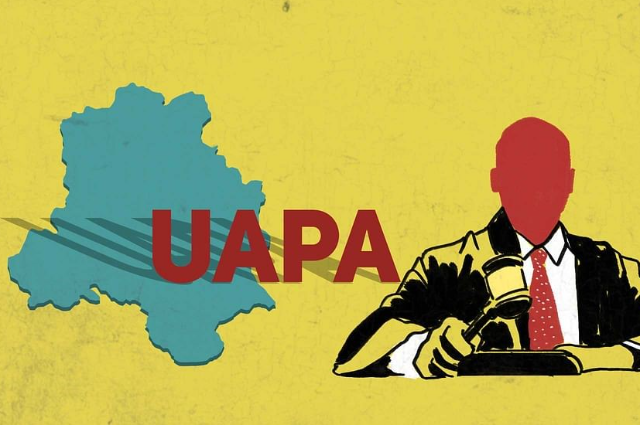
INTRODUCTION:
Unlawful Activities Prevention Amendment Act or commonly known as UAPA was brought into the public domain as an Anti-Terror Act. The Act was passed by both the houses of the Indian parliament and came into force in 1967. The aim of the act was to hold accountable institutions that are suspected to indulge in terrorist activities which are directed against the integrity and sovereignty of India. UAPA Act was deemed necessary after the Prevention of Terrorism Act, 2002 (POTA) was scratched off due to its gross misuse against opposition by the sitting government. The Act has been subjected to various amendments over the years and currently the UAPA Act 2019 is enforceable across the expanse of the nation.
THE MAJOR AMENDMENTS:
The UAPA Act 2019, introduced by Home Minister of the current NDA Government, has established new procedures to deal with the upsurge in terrorist activities in the nation. Under the new law, Clause 5 Section 35i, allows not just institutions but even individuals participating in, preparing for and promoting any terrorist activities to be convicted as Terrorists. If a person is booked under this act, government has the right to withhold all information on why they have been charged and keep them under arrest for a period of 6 months without any fair trial or legal discourse. The Act under its Clause 5 Section 25ii, also allows the National Investigation Agency (NIA) to investigate the cases of terrorism in other states and seize property without the permission or knowledge of the state’s Director General of Policeiii. Under the amended act the cases can be investigated by officers of the rank of Deputy Superintendent or Assistant Commissioner of Police or above. The Bill also permits NIA officers of the rank of Inspector or above to investigate casesiv.
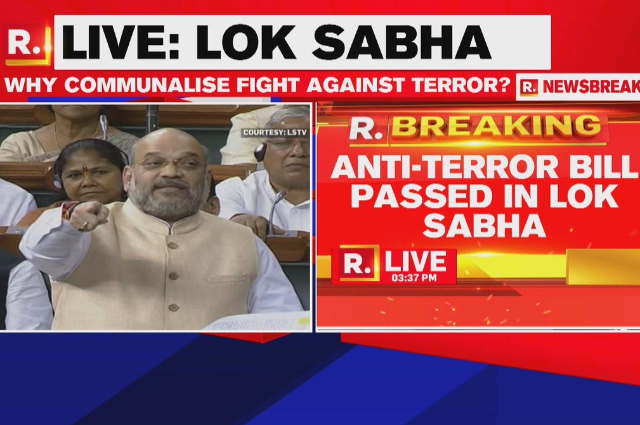
CRITICISMS RECEIVED:
The devil of UAPA lies in its detail. The provisions of the newly amended act have been widely debated for getting more arbitrary and draconian over time and have also been compared to the controversial Rowlatt Act from the British Era. The most intrinsic feature of our legal system where “you are innocent until proven guilty”, is challenged under this law as individuals booked under the act are rather treated as “guilty until proven innocent.” The Act is considered extremely invidious as the accused can be detained without a charge-sheet for over 3 months even in the absence of any hard and fast evidence. This paves way for extremely repugnant consequences for the convict even if later proven innocent. The act charges miscreants who indulge, promote or support terrorist activities of any calibre but the law very vaguely defines “What actually is an act of terrorism?” The law also deems it fit to hold you in suspicion if found with any kind of “terrorist literature” which again is a very obscure and feeble parameter.
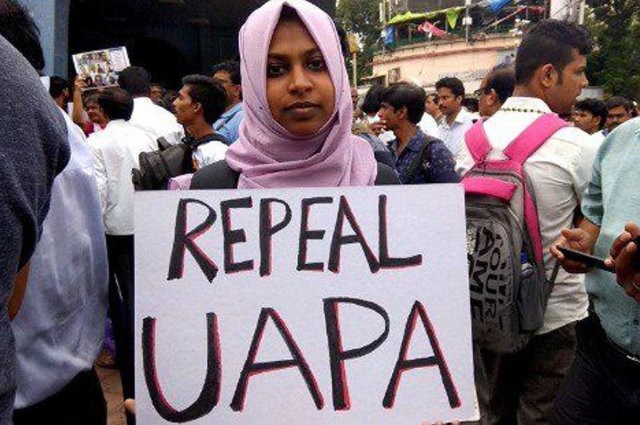
The act has also been compared to “USA’s Anti-Terror Patriot Act”, the rigidity of which is obvious from George W. Bush’s statement “either you are with us, or you are with the terrorists”.
The other criticism that finds its way to the core of this issue is the power vested in hands of the NIA with policing in the states, which as per the constitution comes under the State List
with an only exception to CBI. This is a complete breakdown of the federal structure as it goes against the particulars listed in the constitution. The law ironically itself takes away the sovereignty of the state while trying to save that very same thing.
CHALLENGES MADE IN COURTS:
“I don’t think the UAPA is being misused rather the use of UAPA lies in its misuse, i.e., it is meant to incarcerate people without a fair trial.”
- Umar Khalid
These words come as a no-shocker, as Umar himself has been charged under this act. Under the former POTA Act, statically the conviction rate was merely 1%v, which led majority to believe that at prima facie most of those who were accused were done so merely to stifle opposition and conflicting opinions from a political standpoint. Under the UAPA Act every 3 in 4 personsvi arrested is proven innocent, this clearly tells us that even if the laws might have changed and evolved; the motives of people in power rather remain as primitive as before. The act has been used to arrest many social advocates like Akhil Gogoi, an RTI Activist - the first arrest under the new amendment in 2019 - still awaits trial by NIAvii. Sadly it is a long list CAA protesters like Safura Zargar a scholar from Jamia Milia Islamia, Gautam Navlakha and Anand Teltumbde who have done pioneering work for the Dalits and Adivasis, Meeran Haider an internationally acclaimed Kashmiri photographer, for showing the reality of Kashmir through her lens and later being charged for “anti-national” elements on Facebook based on her photographs.
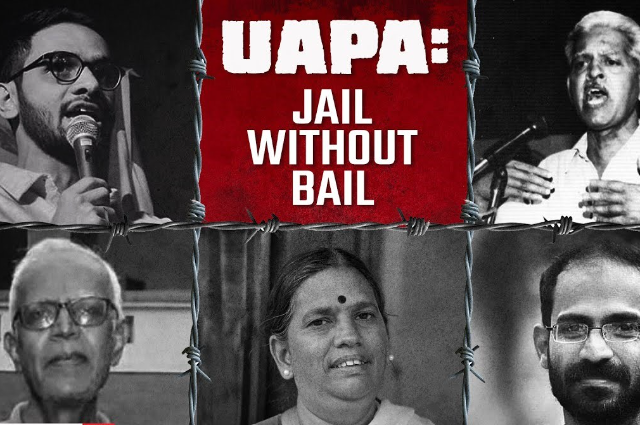
The Law is also viewed as a means of oppression as initially one can be kept in custody for 180 days without any formal legal course of conduct and then any pleas of bail are denied since this law’s prima facie as stated earlier deems you guilty and the charges as true.
The shocking statistics shows that in 2018 itself of the 2,008 cases filed only 317 went to trial, from which less than 30% were actually proven guiltyviii. This paints a very clear picture as to how this law is purposefully being used to supress voice of the opposition and protesters under the grab of this onerous law. The UNHRC had released a statement on 3rd April’ 2020 urging all the states “to release every person detained without sufficient legal basis, including political prisoners, and those detained for critical, dissenting views.”ix Despite which the government stood by the side of this extremely oppressive law and the prisoners still await justice at the hands of this law.
The NDA government has faced various allegations for being bigotry and deeming citizens as anti-national or as per this law “terrorists” for having a dissimilar point of view which gravely undermines the very spirit of democracy. The law disproportionately brings a paradigm shift in power and has since been repealed in the supreme court for its constitutional validity.x
CONCLUSION:
I am of the opinion that freedom not only means absence of restrictions but also having the means and rights to question “valid” restrictions being put on that very freedom. The repealed UAPA Act in Supreme Court is an epitome of the above. The act is challenged for being anti-ethical to the Right to Equality (Article 14) and manifestly arbitrary. The Act also violates the Right to Freedom of Speech (Article 19) and Life (Article 21).xi The cases are ongoing and await judgement. It is in times like these that we come to terms with how detrimental words like “anti-national” or “terrorist” thrown around casually by sensationalist media be, when coupled with vague legislation. Legislations represent the ideals and views that we as a society on a whole hold. If we allow the legislations to get oppressive, democracy ironically will be end of the free will of the very minority, it promised to protect.
Above and beyond, we as an empowered community need to become more tolerant of opposing ideals and be open to criticism that comes our way. Since for any ideology and perspective to flourish and grow it has to do so by using the criticism from opposition as stepping stones rather than locking them up in jails to be forgotten as nothing in history.
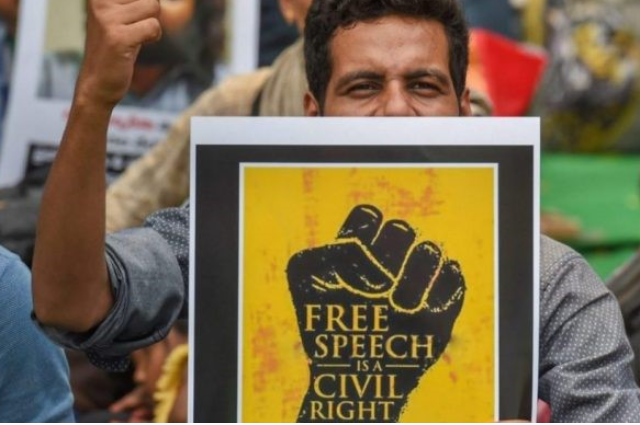
. . .
Reference:
- Clause 5 Section 35, Unlawful Activities (Prevention) Amendment Act 2019
- Clause 5 Section 25, Unlawful Activities (Prevention) Amendment Act 2019
- Clause 1 Section25, Unlawful Activities (Prevention) Amendment Act 2019
- Chapter IV and VI, Section 43, Unlawful Activities (Prevention) Amendment Act 2019
- National Crime Record Bureau Report 2003
- National Crime Record Bureau Report 2019
- The Print, “NIA arrests RTI activist Akhil Gogoi amid Assam unrest, charges him under amended UAPA”,
- Available at: theprint.in/india
- The Wire’s Beyond The Headlines 11 | UAPA Bill: India's Most Dangerous Law Yet, Available at: www.youtube.com/watch
- UN News, Available at: news.un.org/en/audio/
- Sajal Awasthi v. Union of India and Association for Protection of Civil Rights v. Union of India
- Association for Protection of Civil Rights v. Union of India
